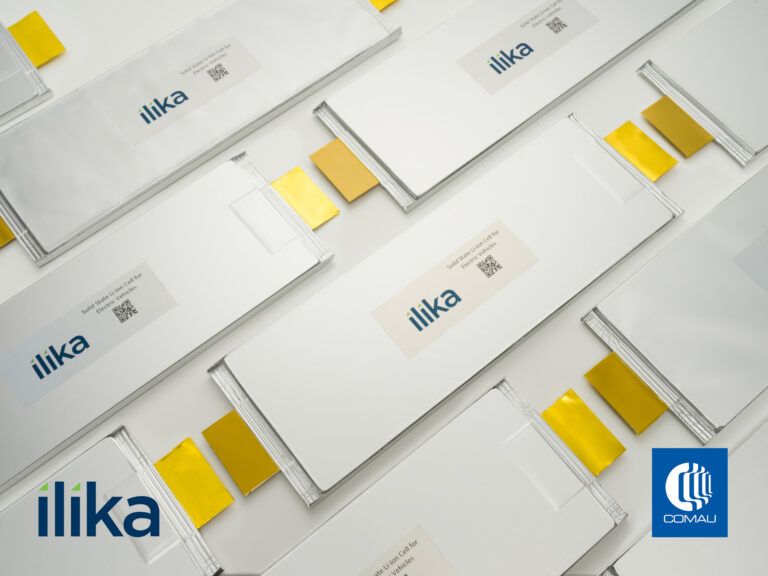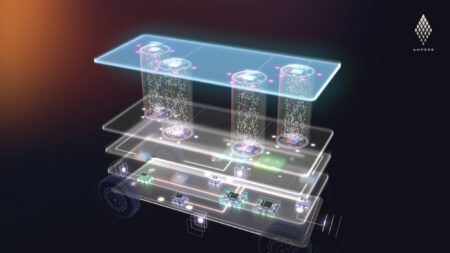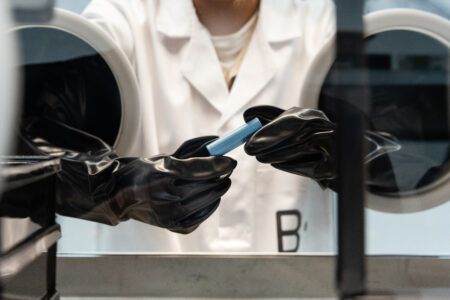A year-long study has revealed the methods and machinery required to bring the production of solid-state batteries up to industrial scales of 100 MWh per year and even up to Gigascales, which could change the landscape for EV battery manufacturing.
Ilika Technologies and Comau – part of Stellantis and developer of solid-state battery technology, have successfully completed a one-year UK Government-funded study to manufacture oxide electrolyte-based solid-state technology.
Comau supported Ilika in developing both a lab scale and industrial manufacturing process with a specific focus in utilizing existing technologies and machines, already available, that require small customization – and reduced investment – for the customers. For technologies not available, Comau developed some concepts of processes and machines to be industrialized in a second phase of the project.
The study identified that the majority (2/3) of all-solid-state cell production steps can be achieved on standard or lightly customized machines equipment currently used in the production of conventional liquid electrolyte-based lithium-ion batteries and other markets. The study went on to identifying a small number of process steps where specific ASSB machine development is required. The project kicked off by Ilika falls into Comau’s long term strategy and plan for solid-state battery production validating a series of manufacturing steps that Comau has plans for in the future.
Comau and Ilika collaborated with their respective knowledge of products and processes over the course of the project. The study phase was finalized and now the two companies have defined a flexible roadmap to achieve the target outlined in the Ilika’s perspectives, towards mass production levels. Comau will support Ilika in the future with all aspects intended to develop in battery industrialization.
Ilika’s production scale-up will be in three stages. The first step, currently underway, will be to scale to 2 MWh per year by the end of 2023: this will be achieved by enlarging its current facility in Hampshire, UK, using funds from a 2021 raise. The Ilika-Comau funded-study focused on an 100 MWh-level capability and the continuation of this work between the two companies will feed into Ilika’s second scale-up step. The third step, at GWh or “Gigascale”, will take place once the 100 MWh facility has been exercised.
Ilika’s Goliath ASSB technology for electric vehicles has the potential to improve pack-level energy and power density, enabling fast charging below 20 minutes and operation to higher temperatures than conventional lithium-ion batteries.
Automotive transformation director at the Advanced Propulsion Centre (APC), Julian Hetherington said: “The UK has a long legacy of automotive manufacturing success and the industry now needs to scale up, at pace, to net-zero emission technologies. We are delighted that the funding awarded to Ilika and Comau through the Automotive Transformation Fund (ATF) has successfully supported collaborative product and manufacturing process development that can unlock routes to subsequent investment in scaled-up facilities.”
John Coombes, managing director of Comau UK stated: “This project represented an integral part of the Comau Journey in Electrification, developed with a joint team of the internal Battery Cells Global Competence Center, in Turin, and Comau UK. We are proud of the collaboration we have had with Ilika and the APC, and also the ability to demonstrate the value our capabilities can contribute in this field.”
Graeme Purdy, Ilika CEO, stated: “This project has successfully validated Ilika’s scale-up plans for its Goliath technology, highlighting some important cost-saving benefits at higher volume production levels which pave the way to gigawatt scale manufacturing. Working with Comau, one of the world’s leading designers of innovative engineering solutions, has delivered a robust plan to scale-up Ilika’s manufacturing capability for Goliath solid state batteries to the next level.”





